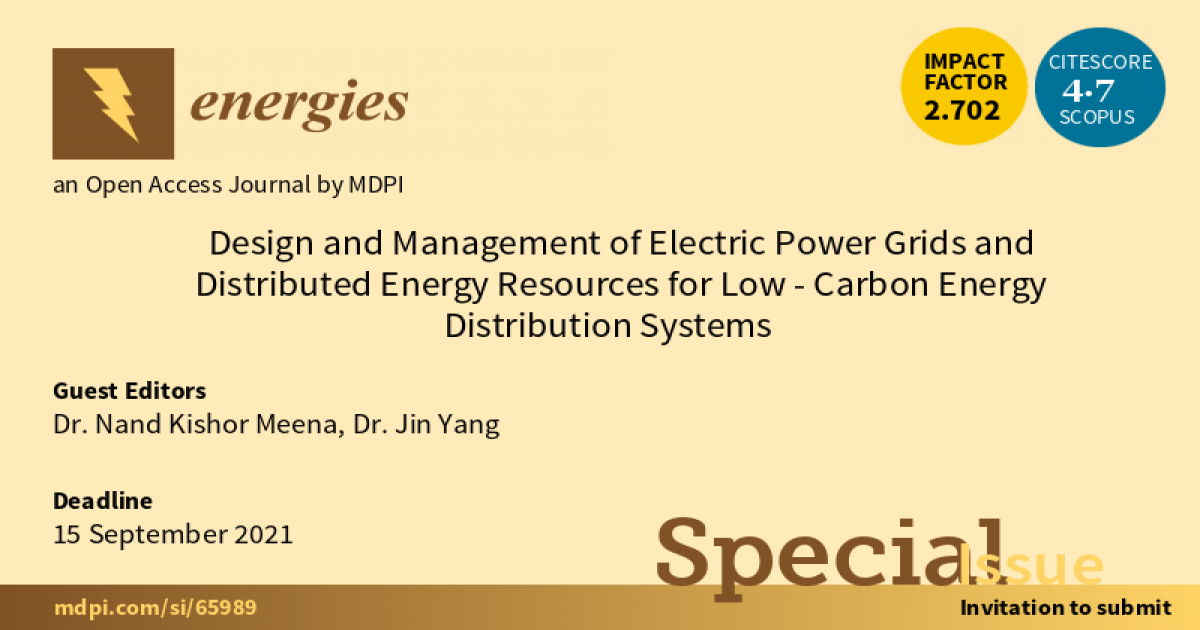Design and Management of Electric Power Grids and Distributed Energy Resources for Low-Carbon Energy Distribution Systems
A special issue of Energies (ISSN 1996-1073). This special issue belongs to the section "E: Electric Vehicles".
Deadline for manuscript submissions: closed (15 September 2021) | Viewed by 5702

Special Issue Editors
Interests: renewable energy; microgrids; optimization; electric vehicles; distribution systems
Special Issue Information
Dear Colleagues,
The growing global interest in low-carbon technologies (LCTs) to meet the goal of a world with clean energy has proliferated the large-scale integration of renewables in distribution networks. A set of LCTs can include distributed generations (DGs), energy storage systems (ESSs), electric vehicles (EVs), heat pumps (HPs), shunt/super-capacitors, superconducting magnetic energy storage, flywheels, demand-side management, etc. The quick growth of various distributed energy resources (DERs) has changed the consumer only characteristic of traditional distribution networks. Moreover, traditional distribution networks had been designed by assuming unidirectional power flow topology, which is not capable of accommodating high renewable penetration. Conflicting goals have made the planning and operation of modern distributions very challenging. The strategic and optimal planning, allocation and operational management can overcome some of the issues caused by high LCT penetration. The optimal integration of smart grid technologies such as power electronics devices (PEDs), automation, optimization, online monitoring and control can offer the required amount of operational flexibility to modern distribution systems to achieve various techno-economic and environmental benefits. This Special Issue of Energies on “Design and Management of Electric Power Grids and Distributed Energy Resources for Low-Carbon Energy Distribution Systems” is focused on the new methodologies, strategies, schemes, optimization frameworks and techniques that solve various design and operation problems of modern distribution systems.
Topics include, but are not limited to, the following research topics:
- Planning and management of DERs in distribution networks;
- State of the art of the design and management of modern distribution grids;
- Optimization methods for the design and operation of distribution systems;
- Optimal planning and management of high renewable penetration;
- Charging infrastructure of electric vehicles with V2G, G2V and V2X operations;
- Integration and operation of various LCTs in distribution grids;
- Sizing, management and control algorithms of different energy storage units;
- Deployment of smart grid technologies in distribution systems;
- Online monitoring, control, sensing and protection of energy systems;
- Network reconfiguration, distribution automation and microgrids;
- Demand-side management and ancillary services in distribution grids;
- Retail energy markets, P2P energy trading and power flow tracing.
Manuscripts addressing any new problem and solution method of distribution systems, which can be based on simulation or experimental results, are also welcome.
Dr. Nand Kishor Meena
Dr. Jin Yang
Guest Editors
Manuscript Submission Information
Manuscripts should be submitted online at www.mdpi.com by registering and logging in to this website. Once you are registered, click here to go to the submission form. Manuscripts can be submitted until the deadline. All submissions that pass pre-check are peer-reviewed. Accepted papers will be published continuously in the journal (as soon as accepted) and will be listed together on the special issue website. Research articles, review articles as well as short communications are invited. For planned papers, a title and short abstract (about 100 words) can be sent to the Editorial Office for announcement on this website.
Submitted manuscripts should not have been published previously, nor be under consideration for publication elsewhere (except conference proceedings papers). All manuscripts are thoroughly refereed through a single-blind peer-review process. A guide for authors and other relevant information for submission of manuscripts is available on the Instructions for Authors page. Energies is an international peer-reviewed open access semimonthly journal published by MDPI.
Please visit the Instructions for Authors page before submitting a manuscript. The Article Processing Charge (APC) for publication in this open access journal is 2600 CHF (Swiss Francs). Submitted papers should be well formatted and use good English. Authors may use MDPI's English editing service prior to publication or during author revisions.
Keywords
- low-carbon technologies
- distributed energy resources
- electric power grid
- distribution automation
- energy distribution systems
- microgrids
- online monitoring and control
- optimization
- ancillary services






